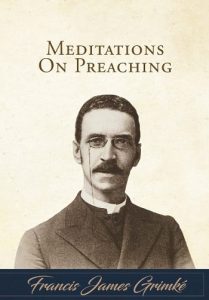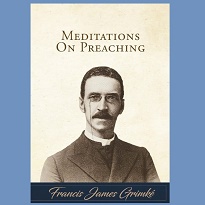 The recent release from Log College Press of Meditations on Preaching by Francis James Grimké (1850-1937) provides a collection of nearly two-hundred thoughts on the practice of pulpit ministry. Entries collected in the blazer-pocket-size book vary in length from as short as a few lines to about three pages, but most selections are two or three paragraphs in length. Introducing the text is a foreword by Assistant Pastor Irwyn Ince of Grace DC Presbyterian Church in the nation’s capital. Rev. Ince was the moderator of the recent PCA General Assembly in Atlanta. The selections were compiled by Caleb Cangelosi. Some selected excerpts will illustrate the central concepts of his philosophy of preaching.
The recent release from Log College Press of Meditations on Preaching by Francis James Grimké (1850-1937) provides a collection of nearly two-hundred thoughts on the practice of pulpit ministry. Entries collected in the blazer-pocket-size book vary in length from as short as a few lines to about three pages, but most selections are two or three paragraphs in length. Introducing the text is a foreword by Assistant Pastor Irwyn Ince of Grace DC Presbyterian Church in the nation’s capital. Rev. Ince was the moderator of the recent PCA General Assembly in Atlanta. The selections were compiled by Caleb Cangelosi. Some selected excerpts will illustrate the central concepts of his philosophy of preaching.
Regarding what constitutes a great sermon—
The greatness of a sermon does not depend upon its literary qualities, or the profoundness of its thought, but upon the extent to which it is used by the Holy Spirit in bringing about spiritual results. Peter’s sermon on the day of Pentecost, plain, simple, direct, pointed, dealing with conditions as they really were, judged by the results that followed, was one of the greatest, if not the greatest sermon ever preached. If, as ministers, we find ourselves desirous of preaching great sermons, let them be great as measured by this standard–great in spiritual effects–great in winning souls to Christ, and in building them up in faith and holiness (page 3)
On the importance of practicing what one preaches—
We search the Scriptures in order to find out what the will of the Lord is. And in preaching we endeavor to set before the people what God would have them do, but unless I myself am practicing what I preach, my preaching will be of no value. We must live what we preach if we hope to influence others, if we hope to command the respect of others. We who preach therefore should be constantly on our guard, should be careful ourselves to walk circumspectly in all our ways. (page 19)
Ministers should be driven by the necessity of the gospel for man.
Such being the case, the preaching of the gospel becomes the most serious, solemn, and momentous task that can engage the attention of mortal man. It is a tremendous responsibility. We can understand the feeling of the apostle Paul when he said, “Woe is me, if I preach not the gospel.” The gospel must be preached because in it is man’s only hope. (page 62)
Ministry out of the pulpit in the world is a time to sow seeds—
As ministers, every time we meet the people in public gatherings, there is an opportunity of influencing them for good and for which we should always be at pains to make the most careful and thorough preparation. It is a time for sowing the precious seeds of divine truth in the hearts of those who are present. We should realize this and come to the task always with an earnest desire to make the most of such opportunities. (page 64)
In the following Rev. Grimké expressed thoughts which any Bible preacher has likely experienced—
I preached this morning a sermon upon which I spent considerable time and labor, and yet, it is almost certain that in a very short time it will pass almost entirely out of the thoughts of those who heard it; little or nothing of it will be remembered. It is rather a discouraging reflection, were it not for the assurance contained in Ecclesiastes 2:1: “Cast thy bread upon the waters; for thou shalt find it after many days.” It shows that our preaching is not in vain, especially when it is faithfully done. Some good is bound ultimately to result from it. (page 72)
From the selections compiled in the book it appears that Pastor Grimké preached topically rather than systematically through books of the Bible, but in the quotes given above, as in many of the selections, the importance of the Bible is noted. It would have been helpful, if the information was available to the editor, to have provided the date that each of the selections was composed. The first third of the twentieth century was a turbulent era in America not only politically and socially but also theologically. For a class paper, a seminarian searching for a topic might examine Meditations in light of some of the new theological views in Grimké’s day.
Added to his abundantly explicit emphasis on the Bible is a subject that goes unmentioned in the book except in a few cases—race. It was not until the war ended that Francis was free. It is not that Rev. Grimké had nothing to say about racial issues, he was a proponent of change and is primarily known for such work—just search his name on the Internet, however he was a pastor with a congregation first. In Meditations on Preaching there is no indication that he believed in different theologies for different races. That is, his meditations show that when he stood in the pulpit all gathered before him, white, black, or another race, needed to hear about the Bible and the gospel.
Log College Press’s Meditations on Preaching is a beneficial resource for learning the thoughts of Francis James Grimké regarding pulpit ministry. His meditations provide material to stimulate reflection on the ministry of preaching.
I apologize to Pastor Irwyn Ince for not noting that he was the first African American PCA moderator. I did not want to bring it up until after I told about Francis Grimké’s background.
Barry Waugh





